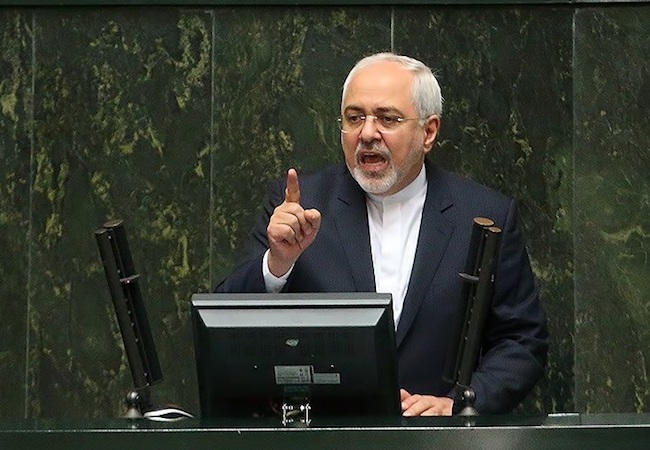Is Iran sacrificing the revolution for petrodollars?

By Lindsay Gabow
“I have heard that they are negotiating and want to sign a new 25-year agreement with a foreign country, and no one knows about it. Do you own the country, while auctioning the country without the knowledge of the people? We made a revolution so that no issue would be hidden from the nation, and no one would consider themselves as the owners of the nation.”[1]
Former Iranian President Mahmoud Ahmadinejad declared the above in late June. The populist firebrand was decrying the forthcoming China-Iran economic and security partnership. The agreement will reportedly include major infrastructure investments, increased defense and intelligence sharing, and a favored export market for Iranian oil.[2] Like other Iranian critics of the deal, Ahmadinejad appears most concerned about the prospect of ceding autonomy to an expansionist superpower. In their fervent opposition to the China deal, Iranian social media users have explicitly invoked 19th century concessions to Russia and Britain.[3] Here, they argue that in providing China such a substantial foothold in Iranian infrastructure and industry, the Islamic Republic undermines the very revolution at the heart of its existence.
In the midst of this nationalist chatter, one criticism of the reported $400 billion deal with China remains noticeably muted, if not absent. Why hasn’t Iran, the self-styled “religious beacon” of the Islamic world, condemned China’s genocidal policies against Uighur Muslims in Xinjiang?[4] Not only has the regime remained mum on China’s atrocities, but it has also confirmed ongoing negotiations for a sweeping 25-year deal with Beijing at the same time the world has placed China on blast for its human rights violations.[5]
Locked in a decades-long regional cold war with Saudi Arabia, Iran is actively competing for hearts and minds in the Middle East. Where Riyadh’s reputation has faltered, with a disastrous war in Yemen and overtures to Israel blighting its record, the Islamic Republic hopes to gain ground. However, the regime may struggle to salvage a reputation as a savior of oppressed Muslims while it partners with a country doing exactly that.
Various U.S. scholars and policy wonks have warned that the burgeoning partnership will compromise our interests in the Middle East. Analysis predicts an expanded Chinese foothold in the region and a massive market for sanctioned Iranian oil.[6] [7] On the surface, it indeed appears that such an agreement will undermine two major U.S. foreign policy objectives: taming its most powerful peer competitor and neutralizing its most troublesome Middle East foe.
But this agreement will not prove entirely advantageous to besieged Iran. The Islamic Republic, buffeted by Western sanctions, international isolation, a hawkish Israel, and, of course, COVID-19, has lost considerable ground economically and militarily. Aspiring for leadership in the Muslim world, Iran has no choice but to rely on its soft-power influence.
Iran has invested heavily in information operations since the birth of the Islamic Republic in 1979. Iran’s religious leadership considered information dominance critical to their consolidation of power. The Atlantic Council observes that today, Iran deems itself “engaged in a perennial information war: against Sunni Arab powers, against the forces of perceived Western neocolonialism, and particularly against the United States.”[8] Observers often confine Iran’s ambitions to leadership of the Shia Muslim world. This assessment is inaccurate. The Iranian regime’s messaging and regional alliances suggest a large-scale effort to court Sunnis as well. The theme of Palestinian plight figures prominently in regime propaganda, for example. Presumably, Tehran’s opposition to “the Zionist regime” supersedes sectarian differences with their Palestinian victims, mostly Sunnis. Moreover, Western officials have long known about Iran’s financial support to Hamas and Palestinian Islamic Jihad.[9]
Whereas Sunni Arab states stridently warn of Iran’s designs on a “Shia crescent” across the Middle East, the Islamic Republic’s vision likely transcends sect. Official regime narratives frame Iran as a “perennial underdog” of the United States, effectively forcing an alliance with other supposed victims in the region and around the world.[10]
Indeed, Iran seeks to market itself as a pan-Islamic savior to all oppressed Muslims. Given the regime’s populist rhetoric, replete with denunciations of the supposed “sell-out” Gulf States, its relationship with China seems inconsistent. For Iran, cozying up to the Chinese Communist Party (CCP) while the world condemns its grievous human rights violations against Uighur Muslims may prove unwise. Iran’s condemnation of the “pro-Zionist” Saudis packs less of a punch while its new business partner imprisons Uighurs in concentration camps, systematically sterilizes mothers, and commits other chilling forms of physical abuse that should alarm anyone remotely familiar with the Holocaust.
Yet, evidence suggests Iranian receptiveness to China. Iranian influence actors have been promulgating pro-China messaging amid the politically fraught COVID-19 global discourse. One well-known actor has persistently praised Beijing’s pandemic response, while amplifying the myth that the U.S. created the novel coronavirus to target China.[11]
While Tehran shares Beijing’s interest in challenging U.S. hegemony, the CCP’s systematic persecution of Muslims will collide with the Iran’s revolutionary spirit. The Islamic Republic should expect its adversaries to serve up familiar rhetoric in their own anti-Iran propaganda. The amplification of its ill-advised alliance with China will surely only tarnish Iran’s reputation in the Islamic world.
References:
[2] https://www.forbes.com/sites/arielcohen/2020/07/17/china-and-iran-approach-massive-400-billion-deal/#3419213b2a16
[4] https://www.atlanticcouncil.org/in-depth-research-reports/report/iranian-digital-influence-efforts-guerrilla-broadcasting-for-the-twenty-first-century/#Chapter_3
[7] https://thehill.com/opinion/national-security/508686-a-china-iran-partnership-would-make-china-the-middle-east-arbiter
[8] https://www.atlanticcouncil.org/in-depth-research-reports/report/iranian-digital-influence-efforts-guerrilla-broadcasting-for-the-twenty-first-century/#Chapter_3
[10] https://www.atlanticcouncil.org/in-depth-research-reports/report/iranian-digital-influence-efforts-guerrilla-broadcasting-for-the-twenty-first-century/#Chapter_3
[11] https://public-assets.graphika.com/reports/Graphika_Report_IUVM_Turns_to_Coronavirus.pdf
Lindsay Gabow is an active-duty captain in the U.S. Army currently stationed at Fort Bragg.
*Disclaimer: The views expressed in the article are those of the author and do not reflect the official position of the U.S. Army or the Department of Defense.




